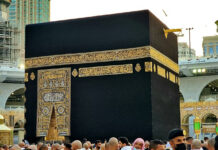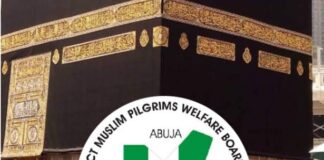By Imam Murtadha Gusau
All praise is due to Allah, the Most Merciful, the Bestower of mercy, the Continually Pardoning, the Most Kind. He owns infinite mercy and He grants all-encompassing blessings.
“Have you not contemplated the fact that Allah placed everything throughout the heavens and everything throughout the earth at your service, and that He granted you immense blessings, both apparent and inconspicuous?” [Qur’an]
I bear witness that none has the right to be worshipped except Allah. There is none who deserves worship besides Him.
And I further bear witness that Prophet Muhammad is Allah’s worshipping servant and Messenger.
Dear Muslims, you must observe Taqwa of Allah, the Most Exalted. Observing Taqwa of Allah yields success in the hereafter as well as in this world. Allah, the Most Exalted, said:
“The hereafter with your Lord is exclusively for the people of Taqwa.” [Qur’an]
Dear brothers and sisters, there are five pillars of Islam among which Hajj is the most important. Hajj is obligatory on every physically and financially stable Muslim once in a lifetime. Being able to perform Hajj is the blessing for all Muslims. Hajj is the form of worship that Muslim owes to Allah Almighty. In the Noble Qur’an Allah the Most High says:
“…Pilgrimage to the House is a duty owed to Allah by all who can make their way to it…” [Qur’an, 3:97]
Muslim can erase all his previous sins by performing Hajj with love and enthusiasm for Almighty Allah.
When pilgrims came back home after performing Hajj they returned spiritually refreshed, forgiven of their previous sins and all set to start their new life free from sins. For those who performed Hajj with sincere intention our beloved Prophet Muhammad (Peace be upon him) said in one of his Hadith:
“Whoever performs Hajj for the pleasure of Allah and therein utters no word of evil, nor commits any evil deed, shall return from it (free from sin) as the day on which his mother gave birth to him.” [Muslim]
Hajj Mabrur (accepted Hajj) is the one which is not mixed with any misdeed. Our beloved Prophet (Peace be upon him) said that:
“Verily there shall be no reward for an accepted Hajj except Jannah (Paradise).” [Al-Bukhari]
Pilgrims should stick to the spiritual values rest of their lives that they learned during the noble journey of Hajj. If pilgrims want to know their Hajj is accepted then they need to focus on their actions before and after performing Hajj. Those whose Hajj is accepted by Allah Almighty are the lucky ones and they are ones whose sins have been forgiven.
Dear Muslims, below I will discuss some signs that will help pilgrims to let them know whether their Hajj has been accepted or not by Almighty Allah:
1. The accepted Hajj refers to the one performed truly and offered with full sincerity to Allah Almighty.
2. Signs of an accepted Hajj also includes that the man returns from Hajj as a better person than the one he was before the Hajj and that he keeps away from sins.
3. The sincerity of intention should remain even after the Hajj. The pilgrim should not show off about Hajj.
4. The sign of an Accepted Hajj is that upon one’s return, his life changes from worst to good. The person who performed Hajj indulges in good deeds and always tries to fulfill the commands of Allah Almighty.
5. If pilgrim Hajj is accepted the person will run away from all those things that Allah Almighty disliked.
6. Pilgrim should try his best to fulfill the obligations laid down by Allah and must be grateful that his Hajj has been accepted.
My dear listeners and readers, the above mentioned were some signs of an Accepted Hajj (Hajj Mabrur). The pilgrim should continue performing good deeds and acts of worship regularly until he meets Allah Almighty.
May Allah accept the Hajj of all pilgrims who performed this year! Ameen
Respected servants of Allah, as I said, when the pilgrims return to their home countries after the journey of Hajj, they return spiritually refreshed, forgiven of their sins, and ready to start life anew, with a clean slate. Family and community members often prepare a celebration to welcome pilgrims home and congratulate them on completing the journey. Those who have performed the Hajj are often called by an honorific title, “Alhaji or Haji Hajiya or Alhaja,” (one who has performed the Hajj).
Dear brothers and sisters, how fortunate are these souls who are blessed with these golden words from the beloved Prophet Muhammad (Peace be upon him):
“Whoever performs Hajj for the pleasure of Allah and therein utters no word of evil, nor commits any evil deed, shall return from it (free from sin) as the day on which his mother gave birth to him.” [Al-Bukhari and Muslim]
And also his saying:
“Verily there shall be no reward for a Mabrur Hajj (accepted Hajj) except Jannah (Paradise).” [Al-Bukhari and Muslim]
It is hoped that all the pilgrims were sincere in their intentions and had traveled thousands of miles only to secure the pleasure of Allah by fulfilling the obligation laid down upon them. May Allah the Almighty grant all the pilgrims acceptance and grant them opportunity again and again to visit the Two Noble Mosques (Haramain Sharifain), ameen.
The pilgrims should focus their attention toward certain points, which are necessary and of utmost importance and which many pilgrims ignore because they are unaware of their significance:
Firstly, the sincerity of intention should remain even after the performance of Hajj. There should be no pomp or show. One should not wish to be called or recognised as Alhaji or Haji Hajiya or Alhaja.
Many people adopt the habit of talking frequently about their journey in order that people may come to know of their Hajj. They talk about the expenses incurred in the way of Allah, their charity amongst the poor and the needy, their devotion and worship, their assisting the weak and old, etc.; and all is mentioned only with the intention of gaining fame. This is a deceit from Shaitan (Satan) who ruins the devotion without the person even knowing it. It is therefore of great importance that the pilgrim does not talk about his Hajj without necessity as it may lead to ‘Riya’ (showing-off, insincerity). However, if necessity arises and one must talk about his Hajj then he is at liberty to do so. But, he must not indulge in this type of conversation unnecessarily.
Secondly, it is noted through experience, that many pilgrims return with only the bad side of the journey and make it a habit of talking about nothing except the hardships they have encountered during Hajj. The pilgrims should strictly refrain from this. On the contrary they should talk about the greatness of the sacred places, the spiritual gains, the enjoyment in devotions, including Umrah, Tawaf, visit to Masjid Al-Nabawi, prayers in Masjid Al-Haram and the Prophet’s Mosque etc. If one looks at his journey of Hajj carefully he will find that the good things far outweighs the bad ones. Every second spent in these sacred places is incomparable with anything in the world.
My people, wallahi the journey of Hajj is a long journey; one has to travel by air, pass the immigrations, go through the customs, security checking, encounter people who speak foreign languages, etc. In these circumstances, difficulties are certain to arise. When we travel in our country do we always travel with comfort and ease? Do we never encounter difficulty? Do we not find ourselves held up in traffic for hours on a Motorway? Considering the fact that two to three million pilgrims perform the rituals of Hajj at one time, in one place and that they all come from different countries and backgrounds and that many of them have never before used or seen the facilities available to them. We think the difficulties encountered are insignificant. Moreover, the pilgrims are rewarded abundantly by Allah Almighty upon every difficulty encountered in their journey whereas the same is not the case when we are on any other journey.
Those people who engage in these types of conversation become the cause of discouragement to others like myself who have not yet had the opportunity to perform Hajj. These unfortunate pilgrims fall into the category of people mentioned in the Qur’an:
“…and who stop (men) from the way of Allah, and from the Sacred Masjid… [Qur’an]
They should take heed that if people are discouraged by their conversation and postpone their Hajj then those who have discouraged them will be equally responsible.
Thirdly the sign of a ‘Mabrur Hajj’ or an ‘accepted Hajj’ is that upon one’s return, his life changes from worst to good. He becomes totally punctual in fulfilling the commands of Allah Almighty. His love and inclination toward the Hereafter increases and love for the worldly pleasures decline. Therefore, it is essential that the pilgrim is watchful over his actions and should try his utmost to instill in himself good characters and refrain from all types of evil. He should try his best to fulfill the obligations laid down by Allah and avoid all the things forbidden by Him.
Respected servants of Allah, it was narrated on the authority of Abu Hurairah may Allah be pleased with him that the Prophet (Peace be upon him) said:
“The performance of two Umrahs (lesser pilgrimage) expiates the sins that are committed in the interval between them, and the accepted Hajj commands no reward except Paradise.” [Al-Bukhari and Muslim]
In another narration, it reads:
“Two consecutive Umrahs cause the sins which are committed therein between them to be forgiven, and the accepted Hajj commands no reward except Paradise.” [At-Tirmithi]
The Prophet (Peace be upon him) said:
“Perform Hajj and Umrah repeatedly for they both rid one of poverty and just sins as the blacksmith’s bellows removes all impurities from iron and gold.” [At-Tirmithi, Ibn Majah and An-Nasa’i]
The bellow is a tool that the blacksmith uses to purify his metals, this may be made clearer through the following Hadith that refers to Madinah:
“Madinah is like a pair of bellows; it expels its impurities and brightens and clears its good.” [Al-Bukhari and Muslim]
Dear believers, scholars have said that the accepted Hajj is the one which is not mixed with any misdeed. Signs of the accepted Hajj as repeatedly mentioned include that the slave returns from Hajj as a better person than the one he was before he left and that he keeps away from sins. The accepted Hajj may also refer to the one performed truly and offered with full sincerity to Allah The Almighty. Imam Al-Qurtubi may Allah have mercy upon him said:
“All interpretations expressed about the accepted Hajj are correlative, confirming that it is the Hajj which fulfills its rulings and is performed perfectly as required of the Muslim.”
It was narrated on the authority of Jabir may Allah be pleased with him that the Prophet (Peace be upon him) said:
“‘The accepted Hajj commands no reward but Paradise.” A man asked, ‘O Messenger of Allah, how would Hajj be accepted?’ He replied: ‘Feeding people and greeting each other with peace profusely.’” [Ahmad and others]
This shows what is meant by an accepted Hajj. The Prophet’s saying: “The performance of two Umrahs expiates the sins that are committed in the interval between them,” emphasises the virtue of Umrah and that it is recommended to perform it as much as one can afford to. Moreover, Umrah causes the sins committed between two consecutive Umrahs to be forgiven. The majority of scholars relied on this Hadith to affirm that it is recommended to perform Umrah repeatedly. They stated that the whole year is a suitable time for Umrah and that it becomes valid at any time except for the pilgrim who is performing the rituals of Hajj. Such a pilgrim cannot perform Umrah until he has done his Hajj. A group of scholars held that Umrah is obligatory for the Muslim only once throughout his lifetime, such as Umar, Ibn Umar, Ibn Abbas, Tawus, Ata’, Ibn Al-Musayyib, Sa‘id Ibn Jubair, Ahmad, Dawud and others. Malik and Abu Hanifah are of the opinion that Umrah is a recommended act and not an obligatory one. Sins in the Prophet’s saying: “The performance of two Umrahs expiates the sins that are committed in the interval between them,” refer to the minor sins, not the major ones, as he said elsewhere that: “Sins committed between two consecutive Fridays are forgiven as long as major sins are not approached.”
 |
| •Imam Murtadha Muhammad Gusau, the Chief Imam of Nagazi-Uvete Jumu’ah, Okene, Kogi State, Nigeria. |
In Fath Al-Bari, Ibn Hajar may Allah have mercy upon him said:
“Some people are unsure as to the fact that Umrah remits sins although avoiding major sins helps in attaining the forgiveness of [other sins], asking, ‘Which sins does Umrah expiate then?’ The answer is that the expiation caused by Umrah is limited to its time, whereas the expiation caused by keeping away from major sins is general and encompasses the whole lifetime of the Muslim, and it is in this aspect that they vary.”
The Prophet’s saying: “They both rid one of poverty and sins,” implies that performing Hajj and Umrah repeatedly causes a Muslim’s wealth to accumulate. Although the Muslim may spend much money on Hajj or Umrah, Allah The Almighty compensates him with better than what he spent for the sake of obeying Him. Allah The Almighty Says:
“…But whatever thing you spend [in His cause] – He will compensate it; and He is the Best of Providers.” [Qur’an, 34:39]
I conclude this sermon with a Hadith reported on the authority of Umar may Allah be pleased with him who once saw a caravan coming back from Hajj and remarked:
“Had the caravan known about the grace and forgiveness they have attained, they would have stopped working. But nay, let them continue working [doing good deeds].”
This shows that the pilgrim should not rely on his work, good deeds and acts of worship that Allah favoured him with during his Hajj. Rather, he should continue performing good deeds and acts of worship regularly till he meets Allah The Almighty, as Allah The Almighty says:
“And worship your Lord until there comes to you the certainty [death].” [Qur’an, 15:99]
Ya Allah, I implore You to grant Your mercy to all who have went for Hajj. I implore You to accept their Hajj, facilitate matters for them, and protect them from anyone who intends ill towards them.
Ya Allah, I implore You to allow them to return to their homelands after Hajj safely, rewarded by You, forgiven by You, and having fulfilled their needs.
Ya Allah, grant Your mercy to the people of Islam and Iman, men and women alike. Keep them united, set their hearts right, grant them Your care, and enable them to be merciful to each other.
Ya Allah, rectify the conditions of all who submit to You in Islam, rectify matters between them, and grant them ample provisions.
Ya Allah, cure their ailing, pardon their sinful, forgive their deceased, enrich their impoverished, and settle the debts of those among them who are in debt.
Ya Allah, make their lands ones of goodness, growth, development, and prosperity. Our Lord is perfect in every way, and exalted above all the falsehood ascribed to Him. He grants protection to all of His Messengers, and all praise is due to Allah, the Lord of all creation.
I pray, Allah accept all our Ibadah (worship) and supplications (Du’as), guide our leaders and provide us with a lasting peace in our beloved country Nigeria, Ameen Ya Mujeeb!
May the peace and blessings of Allah be upon our beloved Prophet and Master, Muhammad peace and blessings be upon him, his family and all his Companions.
This Khutbah (Friday Sermon) was prepared for delivery today Friday, Dhul-Hijjah 22, 1440 A. H. (August 23, 2019), by Imam Murtadha Muhammad Gusau, the Chief Imam of Nagazi-Uvete Jumu’ah, Okene, Kogi State, Nigeria.






















